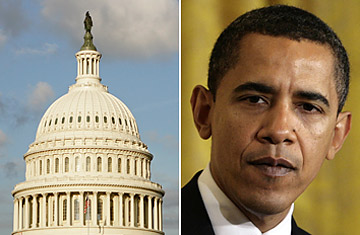
The U.S. Capitol, left, and President Obama
The biggest challenge President Barack Obama faces in trying to sell America on his nearly $900 billion stimulus package is that, as it stands, it's not his. Rather, it is the product of the all-powerful House and Senate committee leaders on Capitol Hill to whom Obama and his team turned over authorship even before the new Administration entered the White House.
Over the course of the transition, when the bill was being drafted, top Obama aides held multiple meetings with committee staffers and their bosses, but in the end, the bill was written on the Hill. "They did a good job of really deferring to Congress," says one pleased senior Democratic aide involved in the bill's creation. (Read "How to Spend a Trillion Dollars.")
Some, however, aren't so pleased with the deference the Obama team showed. Apparently responding to public disaffection, a small but growing number of moderate Republican and Democratic Senators are opposing the bill, which they claim has become loaded down with pet projects and spending that have little to do with spurring immediate job creation and economic growth. "Unfortunately, the House-passed bill is much more like an omnibus bill than a stimulus bill," Maine Republican Senator Susan Collins told reporters on Wednesday after meeting with the President. She asked him to force Democrats to remove things from the stimulus like $780 million for pandemic flu preparation and $14 million for cybersecurity. "The White House would have been better off presenting a bill rather than just outlining priorities."
But that may not have been an option. For one thing, congressional staffers may be the only people in America with the dubious skill of being able to move nearly a trillion dollars into the national economy in a hurry. And Hill staffers claim that Obama needed the leaders of the various committees to tell him what the bill required to garner enough votes to pass. Either way, the fact that the bill is the product of free-spending congressional committees is likely to hurt Obama. It is defining his first major effort to fix the economy not as a new way of doing business in Washington but as a massive exercise in more of the same.
Martin Feldstein, the conservative economist who has been advising the White House as well as Hill Democrats and Republicans, was an early advocate for the stimulus but turned on the bill the House produced. He says the Senate bill, unveiled on Tuesday, is equally wasteful. "[Obama's team] turned it over to the congressional staffs," Feldstein says, and the result is that the bill spends like Congress always spends: with an eye to benefiting regional constituents. The problem, he contends, is that the bill's goal is to boost overall national spending, which is a very different thing.
Feldstein doesn't blame Obama or Larry Summers, the President's economy czar, whom Feldstein taught at Harvard and whom he has been advising in private in recent months. "The White House has been on the job for a few weeks," Feldstein says. "So if you said to them, 'Please design a program for improving the water supply of the United States,' Larry Summers is a brilliant guy, but he probably doesn't know a lot about water supply. And there's a committee in Congress that's been working on this for years."
Congressional staffers who wrote the legislation reject the criticism, arguing that such projects, and the tax cuts and direct state aid that form the bulk of the bill, are necessary to win votes. "If you're the White House, you have two concerns, just like we do," says the Democratic staffer involved in writing the bill. "I want something that's going to fix the economy and I want something that my chairmen say can pass."
By this staffer's account, during the transition, Summers, his deputy Jason Furman and the White House's top congressional liaison, Phil Schiliro, laid out the broad principles they wanted the bill to adhere to, but when it came to actual content, they deferred to the committee leaders. "Because otherwise what's the point in doing something, pie in the sky, if it doesn't have the votes?" the staffer says.
Of course the bill isn't set in stone, and Feldstein, who spoke with congressional Republicans on Tuesday, says it may change before it is passed, either before it clears the Senate or when it is in conference with the House thereafter. Indeed, the Senate voted on Wednesday evening to add a home-buying tax credit to the package, and Obama spent part of the day meeting with Senators like Collins and Nebraska Democrat Ben Nelson, who want to cut tens of billions of dollars in spending from it.
This is where Obama's next big test lies: the President may not be able to claim authorship of the bill, but an aggressive editor can change a lot. The question is whether the White House will accept the Hill's arguments for what is needed to pass the bill, effectively letting the Democratic committee leaders price the value of Obama's political capital, or whether the Administration will see for itself what the market will bear.
